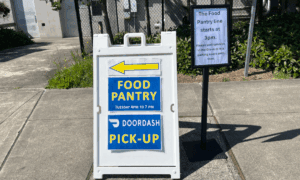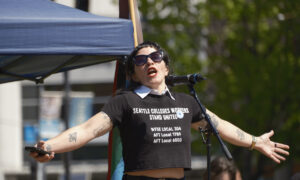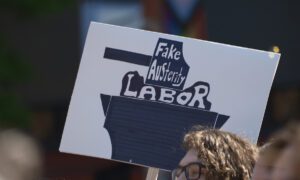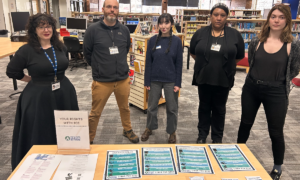On Wednesday, Nov. 18, a Seattle Colleges employee who tested positive for COVID-19 came into contact with a security officer at Seattle Central’s Broadway Edison building. Despite security protocol prohibiting anyone with COVID-19 from coming to campus, Christel Olsen, from the Environmental and Health Safety office at the district, directed the employee to pick up a package, including a key to a student residence where he planned to isolate away from his family.
The employee said Olsen told him to call security and that they would give him the package. Olsen did not specify that he stay outside to avoid infecting anyone else. She did not respond to a request for comment from the Collegian. Central’s security office was not aware that they would be interacting with an employee who tested positive for COVID-19 that day, according to three officers, including the officer who handed the package to the individual.
That officer, who is now in quarantine, said transferring packages is normal for security officers but that the college has not provided them with updated procedure for interaction during the coronavirus pandemic. Others in the department confirmed that they are not aware of any procedure for transferring packages and deliveries. After one officer’s concerns about a potentially contaminated office weren’t addressed, he went on leave with no pay, citing severe medical conditions that put him at especially high risk.
Roberto Bonaccorso, Central’s Public Information Officer, says that the college followed “strict protocols” in response to exposure. He adds, “We have instituted strict procedures for classes that must take place because of certification requirements, and adopted detailed work plans for people who must work in our buildings in accordance with state and county health guidelines.”
According to Bonaccorso, the college “gave employees in the affected departments specific instructions for how to avoid spreading the virus and asked 11 people to go into quarantine.” But he also says that there is no specific protocol for packages to avoid exposure to the coronavirus.
According to a Monday, Nov. 23 email, sent on behalf of Lincoln Ferris, Interim Vice President of Administrative Services, communication was only provided after concerns were raised from facility and security personnel. Ferris also told facility and security personnel that he could “only conclude that you forgot the prohibition in your department’s infection control plan to stay at a social distance. I am assuming this occurred either when those 11 were performing work tasks or when gathering to talk or socialize.”
The officer that dealt directly with the infected individual says if he had known that someone with COVID-19 would be visiting the campus, he could have avoided direct contact with the person. He handed the package to the infected worker, who did not enter the building, but he says he could have set it somewhere outside to avoid coming into contact with the individual.
The individual, who expressed shock that the officer had not been warned, says it feels like the “college doesn’t care,” about keeping people safe. The officer says he would have felt more prepared if the school had sent a community wide message that someone on campus was infected. Specifically, he adds that the school should have told him that he would be interacting with an infected individual.
The only communication that officers received was a school-wide message to the community sent on Thursday, the day after the package exchange. It specified the building where exposure to the virus occurred, but security officers have yet to receive any instructions from the college on what happens next.
The officer says he let the district know he had been in the security locker room, the security station on the north end of campus, and the main security office after his exposure to the virus. But according to Mayes Battle, who oversees custodial services at Central, custodians do not have access to the inside of the locker room and have not disinfected it.
Multiple officers have confirmed that there has been no communication on the disinfection of the room despite rising concerns from at least one officer. Battle confirms that custodial services have disinfected other areas where the officer was after exposure.
According to Johnson in an email to one of the security officers’ inquiries, facilities had let him know that the locker room was disinfected twice a night alongside the main security office and north station since October 26th.
Asked about the security situation, Bonaccorso told the Collegian that the college could not address specific departments or individuals because of “employee privacy laws.” The Federal Health and Information Privacy Act and the American Disabilities Act both restrict information the school can share about the medical condition of employees.
Contacted by the Collegian, Darryl Johnson, the Director of Security, deferred to Bonaccorso. Johnson, who left school at noon on Thursday, told one officer he would be working from home after the school-wide message was sent out about the COVID-19 exposure on campus.
Other officers, who don’t receive hazard or essential pay and who cannot work from home, don’t have that option.
Author

Alexa is an avid journalist seeking an A.A. with an emphasis on Global Studies at Seattle Central College. She's interested in pursuing investigative journalism to report on social struggles like immigration, civil rights, and access to education in South and North America. She is currently working to cover budget cut reforms at Central and civil rights movements in Seattle. Alexa is also a Youth Council Member at OneAmerica, advocating for greater access to quality education for immigrants and refugees in WA. She is a first-generation American who has travelled to 13 countries to explore world cultures and politics.







Be First to Comment